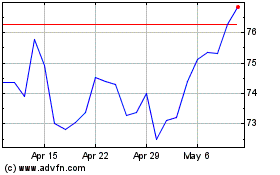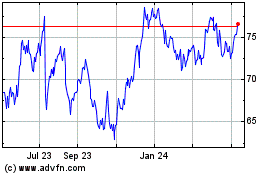2nd UPDATE:State Street,Northern Trust Haven't Changed Deposit Pricing
August 04 2011 - 5:56PM
Dow Jones News
State Street Corp. (STT) and Northern Trust Corp. (NTRS), two
large trust banks, haven't changed their pricing on customer
deposits, representatives for the two companies said Thursday.
The statements follows news that rival custodian Bank of New
York Mellon Corp. (BK) told customers it would start charging for
increases in some deposits over $50 million, a sharp move as banks
see deposits pile in.
The representatives from State Street and Northern Trust
declined to comment further on any customer pricing decisions.
Wells Fargo & Co. (WFC), the nation's second-biggest deposit
holder after Bank of America Corp. (BAC), doesn't charge
corporations to hold deposits, a spokeswoman said, and added the
bank has "no plans to charge our customers for increasing their
deposit balances." Some retail consumers are charged a fee to
maintain an account, but not specifically for deposits. Wells
Fargo, like most retail banks, pays interest on many consumer
deposits.
A spokesman for U.S. Bancorp (USB), which has a smaller
custodial operation than Bank of New York Mellon or State Street,
also said the bank hasn't changed its policy.
A spokeswoman for Citigroup Inc. (C), meanwhile, said, "While it
is not our policy to discuss client pricing, deposits are priced in
line with market rates." However, unlike Bank of New York Mellon,
Citi won't charge "negative interest rates," as the charge on
deposits in effects creates, a person familiar with the matter
said.
Citi is a major competitor of Bank of New York Mellon in the
custody business, and moves trillions of dollars around the world
for global businesses and the U.S. government. Some of that money
stays temporarily as deposits at the bank.
A spokesman for Bank of New York Mellon said only "a small
number of clients with extraordinarily high deposit levels where
the deposits have increased significantly in recent weeks" will be
affected by the pricing change.
A representative from J.P. Morgan Chase & Co. (JPM), which
is a large custodian, wasn't immediately able to comment.
Bank of America, which also has a custody business, declined to
comment Thursday.
Deposits at State Street, which as a custodian deals with large
corporate clients and other banks as customers, soared during its
second quarter. Deposits as of the end of June were up $18 billion,
or 17%, from the end of March, and up more than $27 billion
year-to-date. Bank of New York Mellon said it's incurring costs
such as deposit insurance on the surge of deposits, but is having
difficulty investing the money to earn a return.
With markets in turmoil, and U.S. Treasurys yielding slim
amounts, large cash holders have been parking their cash in banks.
BNY Mellon said clients have been seeking a safe-harbor and it was
notifying customers with "extraordinarily high" deposits it could
charge 0.13% on deposits.
Banks, meanwhile, have little opportunity to put money from
clients to work. Loan demand from businesses is improving slightly,
but remains weak overall, and securities are considered risky. As
of June 30, deposits at domestic commercial banks rose 5.1% from a
year earlier, to $7.1 trillion, while loans fell 2.2%, to $6.1
trillion, according to data provided by the Federal Reserve.
J.P. Morgan parked $170 billion in deposits at central banks at
the end of June. The amount was four times the amount a year
earlier, and is considerably more than all the deposits held by
SunTrust Banks Inc. (STI), which, with about $120 billion in
deposits, is the seventh-largest U.S. bank by that measure.
-By David Benoit and Matthias Rieker, Dow Jones Newswires;
212-416-2458; david.benoit@dowjones.com
--Robin Sidel and Marshall Eckblad contributed to this
article.
State Street (NYSE:STT)
Historical Stock Chart
From Jun 2024 to Jul 2024

State Street (NYSE:STT)
Historical Stock Chart
From Jul 2023 to Jul 2024
